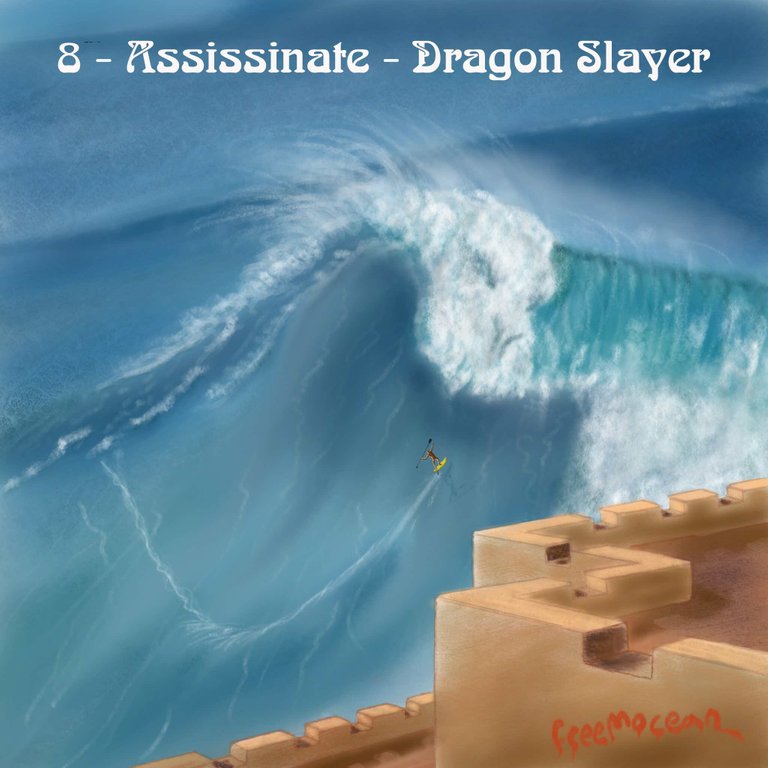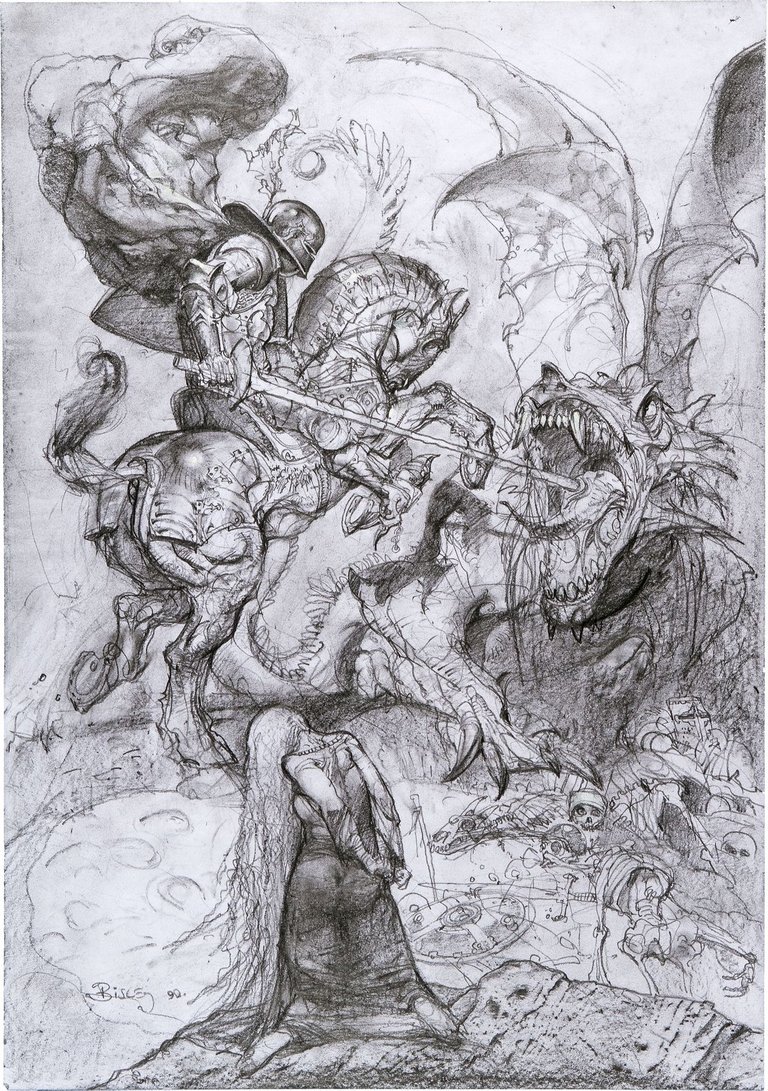St. George and the dragon - illustration by the artist Simon Bisley, (the others are my work)
The dragon represents our dark side and the battle within ourselves. Also how we tend to project this onto others if we have not recognised that all people are capable of both great courage and kindness as well as selfishness and cruelty.
It is normal to want or fear certain outcomes.
It is normal to form ideas that may influence those outcomes.
We turn these ideas into actions and test them, some work well, most need some more work.
I like the way Jordan B Peterson talks of morality like a personal choice to be a slightly better version of ourselves each day. This achieves many things but there are two outcomes that I feel, he brings to light beautifully.
The commitment to constant realistic, (attainable) improvements helps us to cope with the injustices and disappointments we witness without denying the reality of our situations. To me this reads as the choice of positive action regardless of our thinking and emotional state.
The other is that this helps us to recognise, take responsibility for and manage our shadow self, our dark side, which I see as a collective challenge, rather like Eckart Tolle’s “pain body”.
Mr. Peterson explains the metaphor of Christ dying for our sins as the realisation that we all have the capacity to be monsters and saints and even to enjoy it, equally. What matters is that we embrace who we are and choose not to feed or enact these anti-social behaviours.
If we deny them, they will often come out anyway in some form or another such as projecting them onto others, whom we can then blame and attack,(The dragon). Part of a vicious circle of shame and guilt that then goes on to feed addictions.
I feel this is because of the way memory creates emotions that act on our biology. The memories and thoughts we empower come to shape our posture, language, actions and by extension, our relationships.

So what do I mean by “Empowering” thoughts and memory?
What gives weight to thought is repetition and strength of emotion. It is repetition that enters it into memory and it is emotion that holds it there.
What drives the strength of emotion is how we feel “personally" involved, invested or effected by the thought, which has, by now become a narrative, story, belief or opinion.
The emotion is the feeling of the chemical cocktail of endorphins, nuero-transmitters, hormones and action potentials created to prepare us for the situation represented by the idea.
If there is an element of defence, attack or motion required then there will be muscle tension and some excitement. ( this may become addictive to a person who is otherwise emotionally insensitive to themselves and others)
If the cocktail produced holds the promise of something that does not trigger the fight or flight response, we will likely relax.
We choose ideas that bring us the feelings we want, we tend to make these our ideals, and organise our lives to move closer to them.
Now we will tense and contract, and produce chemicals dependant, not so much on what is happening but on how that compares to our ideals.

In summary
People have ideas, when we get attached to them, we make them personal and they become Ideals.
Ideals rarely match reality, or there would be no need for them.
This mismatch and drive to create alignment brings back to mind the thoughts and emotions with which our stories are anchored.
So while it is functional to choose a “better” version of ourselves, it is dysfunctional to turn these into “should’s and should nots”, worse to project those onto the behaviour of others.
Our personal vision of “better” is a private game, it may or may not inspire and bring comfort to others. If it does, then our lives will be warm and fun. If our version of “better” does not take into account the effects our actions have on others, we are unlikely to enjoy any harmony in our relationships, and will be more likely to seek “alliances” for greater control.
Why would we choose control, and the inevitable conflict that creates, when we could enjoy the vastly greater abundance of accepting what is often offered affably or even freely when we are a little more chilled out?
Well I am no expert, but it points to not having looked into and owned our shadow side and taken responsibility for both our own pain and the ability we have to inflict it on others.
All things must and will die, that is how nature cycles organic matter through the diverse life forms that sustain ecology. Taking life to eat, is not violence unless it comes with the emotions of violence. Behaviour matters but the emotions driving that behaviour arise from either reality as it is, or our ideals,(reality as we think it ought to be).
Imposing our ideals onto others and not letting them feel and act in a way that is natural to them arises out of distrust.
Distrust arises from bad experiences, but it also arises when we know, deep down what we are capable of, and are not completely sure what we will choose to do about it.
The practice of choosing the best version of myself over and over builds the confidence that is displayed in my movement and language - It says, I trust myself, therefore you can too.
Philosophy is great, but this really is a daily action. For me it is much harder than diet changes and movement training.
Thank you for reading.

This was a great Sunday morning read. And very relevant to me today, although I suppose it is relevant to everyone.
Thank you so much for reading, I am glad it made sense.
I am writing notes to my future self, like I dont trust myself to remember to choose actions more carefully - days are precious and our loved ones deserve the best we can manage each day.
Of course life is never smooth, and we learn from messing it up also :)
Your writing makes it sound like these are thoughts deeply ingrained, or at least that is what I imagined. We have the opposite in common then - I'm always making notes for my future self. Too easy to forget.
biology and philosophy are my interests, but turning insights into actions is not easy when our emotions get in the way.
The whole journey of discovery is a process of healing, and it takes time to practice and embody.
Also what happens is if I can explain something clearly, then I understand it, and the next piece is ready to fall into place - so Steem is like my testing ground - which is why I appreciate your feedback.
Have you ever gone back and read things from 10 or 20 years ago?
Do you think that doing that helps us to be more gentle on ourselves?
I'm in my early thirties, and I'd say only in the last 5 years or so have my thoughts on life been relevant. My diaries from prior are much more simple minded, so not so beneficial for me, but the more recent stuff is. Or, I guess seeing growth always is beneficial. Yes, I do think getting the thoughts on paper/screen is very important. Has a way of clarifying those thoughts so that they are more permanent.
Steemit is an interactive diary for me. I like it when I hear of people using it in the way you are. It's more than a ploy for income.
I found something I wrote when I was in my early 20's, 47 now.
It was also more simplistic, certainly idealistic.
Funny I wrote that I wanted to be able to do the splits as a goal...still working on that one lol..
Anything that is improving is great, helps to build realistic confidence based on competences. Which I guess is much better than complaining about the world and projecting anger and tension....I have tested that and it really sux lol..
Have a great day :)
Nice topic. Very informative also.